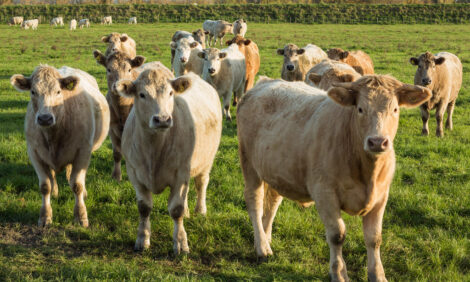



Schafer Talks Trade, Ethanol and Fram Bill
US - Newly confirmed Agriculture Secretary Ed Schafer addressed the Cattle Industry Annual convention in Reno, Nev. While there is less than a year left in President Bush's term, Schafer made it clear he has no plans to be a "caretaker" at USDA| Ed Schafer, Agriculture Secretary |
“When I visited with the President,” said Schafer, “and we had the conversation about me becoming the Secretary of Agriculture, he said, ‘Ed, I want you to weigh in on trade issues – this is important.’ He asked me to get involved, and I certainly will.”
Schafer reported that while there is still much work left to do, U.S. beef is regaining global market share thanks in part to the World Organization for Animal Health (OIE) “controlled risk” designationfor BSE.
“With that rating in hand, we’ve been able to open markets for American beef that have been previously closed to us,” said Schafer. “Once those markets are open, we see that our export sales grow rapidly as consumers respond to the quality of American beef. In fact, we expect our exports of American beef for 2007 to total more than $2.6 billion – up over 30 percent.”
Schafer named several promising markets that recently opened, including Russia.
“Just in the last couple of months, Indonesia, Barbados, and the Philippines have all agreed to open their markets to U.S. beef under OIE guidelines. And we have resumed beef shipments to Russia,” said Schafer. “And we expect to see continued growth in that market.”
The Secretary was also optimistic that progress will be made with Korea and Japan.
“We’re also very interactive with Korea, and I believe we have reasons to be optimistic. We look forward to working with the incoming (Korean) administration to achieve full reopening of this important market as soon as possible,” he said. “And we will continue working with the government of Japan at the highest levels to bring their market into full OIE compliance as well.”
On the topic of the 2007 Farm Bill, Schafer addressed the Administration’s ongoing concerns. He said without fixing, the new Farm Bill could be vetoed.
“The administration has serious concerns about both the House and Senate versions the bill. We simply don’t believe that programs in the Farm Bill should be funded by tax increases on the rest of our country."
But Schafer acknowledge that there are many good things in the Farm Bill, including increased conservation funding.
“One good thing is increased funding for conservation programs that both the House and Senate would provide,” he said. “Programs that help farmers and ranchers in non trade-distorting ways - while bringing environmental benefits to the broader community - are important.”
On the subject of Country of Origin Labeling (COOL) for meat, Schafer agreed that the Farm Bill makes COOL more workable.
“Both the House and Senate versions of the Farm Bill include language that would make it easier to comply with the country-of-origin labeling requirements, and I know that’s something you all have worked very hard to bring about.”
The Secretary recognized the growing frustration among cattlemen with the nation's energy policy, and especially its impact on grain prices. But he says development of cellulosic ethanol sources shows great promise.
“For today and tomorrow, the growing demand for ethanol is likely going to mean that corn prices are going to stay higher than what you want them to be,” Schafer acknowledged. “As we move to non-feed sources to generate our energy, it will stop distorting the prices of your feed.”
About 5000 cattlemen from across the nation are attending the Cattle Industry Annual Convention, which runs through Saturday.
TheCattleSite News Desk


